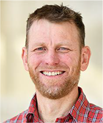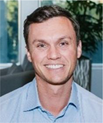Mapping multi-sectoral methane emissions across Queensland’s gas production areas
Joe Lane A * , Jamin Wood A B , Sebastian Hoerning A and Philip J. Hayes AA
B

Joe Lane is a Senior Research Fellow at the University of Queensland Gas & Energy Transition Research Centre (UQ-GET), co-leading the Centre’s Decarbonisation research theme. His PhD and research focus are on environmental accounting and energy transition tradeoffs. |

Jamin Wood is a Research Scientist at UQ-GET, working across fugitive emissions and the techno-enviro-economic assessment of novel decarbonisation technologies. He has a Bachelor’s in Civil Engineering and a PhD in Biochemical Engineering. |

Sebastian Hoerning is a Research Fellow at UQ-GET, with a Doctorate in Environmental Engineering through the University of Stuttgart. His research focusses on geostatistics, stochastic modelling and the incorporation of data into modelling workflows. |

Philip Hayes is Associate Professor of Water Resources and Gas Development at UQ-GET, and co-lead of the Centre’s Decarbonisation research theme. He is a geoscientist and hydrogeologist working across single-phase aquifers and dual-phase reservoirs, with a degree in Physics and a PhD in Civil Engineering. |
Abstract
If the evolution of methane satellite technology leads to credible estimates of inter-annual regional emission trends, the need for effective attribution (across sectors) of that top-down data could become critical. This poses a particular challenge for Queensland’s Surat Basin, given the complexity of disentangling the various emission sources – the highly distributed coal seam gas infrastructure is intermingled with grazing cattle, feedlots, farm dams, groundwater bores, landfills, wastewater treatment plants, coal mines and abandoned coal exploration holes. Emissions from many of those sources are poorly understood. We generate spatially disaggregated, time-series estimates of Queensland’s methane emissions, integrating the best available scientific knowledge across all source types, and novel summaries of previously unaccounted for methane sources. The results identify the challenges for effectively attributing top-down methane concentration measurements to sector-specific fluxes in the Surat Basin; and the risk that planners misunderstand causality of any long-term changes in regional methane production, as the quality of satellite-based estimates improves.
Keywords: coal seam gas, fugitives, gas production, greenhouse gas, methane emissions, quantum gas lidar, satellites, Surat Basin.
 Joe Lane is a Senior Research Fellow at the University of Queensland Gas & Energy Transition Research Centre (UQ-GET), co-leading the Centre’s Decarbonisation research theme. His PhD and research focus are on environmental accounting and energy transition tradeoffs. |
 Jamin Wood is a Research Scientist at UQ-GET, working across fugitive emissions and the techno-enviro-economic assessment of novel decarbonisation technologies. He has a Bachelor’s in Civil Engineering and a PhD in Biochemical Engineering. |
 Sebastian Hoerning is a Research Fellow at UQ-GET, with a Doctorate in Environmental Engineering through the University of Stuttgart. His research focusses on geostatistics, stochastic modelling and the incorporation of data into modelling workflows. |
 Philip Hayes is Associate Professor of Water Resources and Gas Development at UQ-GET, and co-lead of the Centre’s Decarbonisation research theme. He is a geoscientist and hydrogeologist working across single-phase aquifers and dual-phase reservoirs, with a degree in Physics and a PhD in Civil Engineering. |


